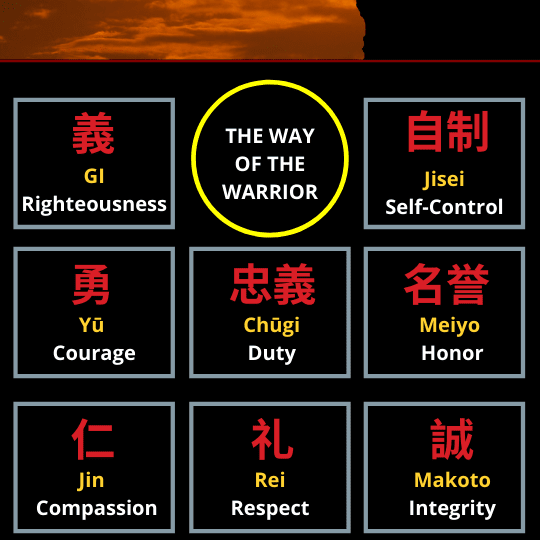The translation for Bushido, literally warrior’s way, was first coined as a term in the early 17th century, in the 1616 military chronicle Kōyō Gunkan. Similar terms used at the time included mononofu no michi, samuraido, bushi no michi, shido, bushi katagi, and many others in Japan related to Samurai.
In fact, many similar words predate bushido as well. Japan had been a warrior culture for centuries before the beginning of the Edo period in the early 17th century. However, not all of them were exactly like bushido, nor did they serve the exact same function.

8 Codes of Bushido
The Bushido Code consisted of eight virtues, or principles, that its followers were expected to follow in their daily lives. These are:
Justice – Gi
Bushido applies martial truth and personal purity: justice is Bushido’s strongest virtue. It is described by a famous samurai as follows: ‘Truth is the power of a person to determine behavior in accordance with reason without hesitation; To kill when it is right to die; Attack when it is right to attack. Another says: ‘Straight is the bone that provides firmness and stature. Without limbs, the head cannot sit on the back, cannot move its hands, cannot stand on its feet. Thus, neither merit nor education can transform a human being into a samurai without righteousness.
Justice is the fundamental quality of a samurai. Incorporating the Bushido principle of justice into your life requires proper reflection on matters and upholding the importance of good character.
Bravery – Yu
Bushido distinguishes courage from bravery: courage is revered only when it is displayed in the name of justice and righteousness. Confucius says in his Analects: ‘There is no lack of courage in perceiving and doing what is right.’ Simply put: ‘courage does the right thing.’
Courage means understanding what is right and what is wrong, as is justice. Courage demands not only the courage to understand but also the courage to act.
Compassion – Jin
A person with the ability to control and the power to kill must have the same extraordinary power of benevolence and compassion: love, generosity, affection for others, kindness and compassion are signs of blessings, the highest qualities of the human soul. The greatest demand of the ruler of man is claimed by both Confucius and Mencius to be better.
Compassion is the willingness to express love and sympathy through patience. It also involves trying to see the universe from another’s point of view. This is a special characteristic for anyone with leadership potential.
To respect – Rei
The difference between obedience and politeness can be difficult for casual tourists visiting Japan. Nevertheless, the courtship is based on benevolence for a true person: both are recognized by international tourist courtesy and good manners as typical Japanese character. But the humble should show generous respect for the feelings of others; It is a bad quality if it is motivated only by the suspicion that it offends good taste. Solitude addresses passion at its finest.
Respect is making sure that you recognize and appreciate the experiences and feelings of others. Politicization should be used to work with another human being.
Integrity – Makoto
According to Nitobe, the true samurai despised money, claiming that “people would rebel against money for the sake of money to prevent knowledge.” Thus, high-ranking samurai children were raised to think that talking about money displayed bad taste. His misgivings about the value of various coins demonstrated good breeding: bushido promoted the practice of frugality and moderation, not just for economic purposes. Luxury was considered the greatest threat to manhood. The Warriors class should be very simple… counter machine and abacus detested.
To practice many other values, one must maintain integrity. It means living an honest and upright life.
Honour – Meiyo
Although bushido is concerned with the career of the soldier, it is also interested in non-martial conduct: the samurai is distinguished by the value of honor, a lively sense of honesty, and dignity. Born and brought up to appreciate the functions and rights of your profession. The dread of shame hung like a blade over the samurai’s head… He was mocked as ‘hot-tempered’ for committing a crime even on mild provocation. According to the traditional saying: ‘True patience means wearable.’
Warriors were samurai who maintained a sense of self-worth and acted according to the highest code of conduct. You must recognize the spiritual obligation to respect the concept of honor.
Loyalty – Chugi
Economic factors have influenced international corporate commitment. Nevertheless, real men remain loyal to those to whom they owe a debt: the most characteristic feature of the feudal period was loyalty to one’s superior. There are individual allegiances for all types of people: pickpocket groups swear allegiance to their leader. Yet loyalty is of utmost importance only in the code of chivalrous honor.
Be true to yourself first. It should also not be abandoned in challenging circumstances where the penalty is offered to another person.
Self-control – Jisei
Bushido encourages men to follow an absolute moral principle that is beyond reason. That’s right, and wrong things are wrong. No argument is open to debate or argument, nor can the distinction between good and bad and right and wrong be made, and a person must know the difference. Ultimately, humans should teach moral values to their children through their behavior model. The first goal was to build character – samurai schooling. There were less nuanced abilities in prudence, intelligence and dialectic. Intellectual mastery was appreciated, but a samurai was mostly a worker.
